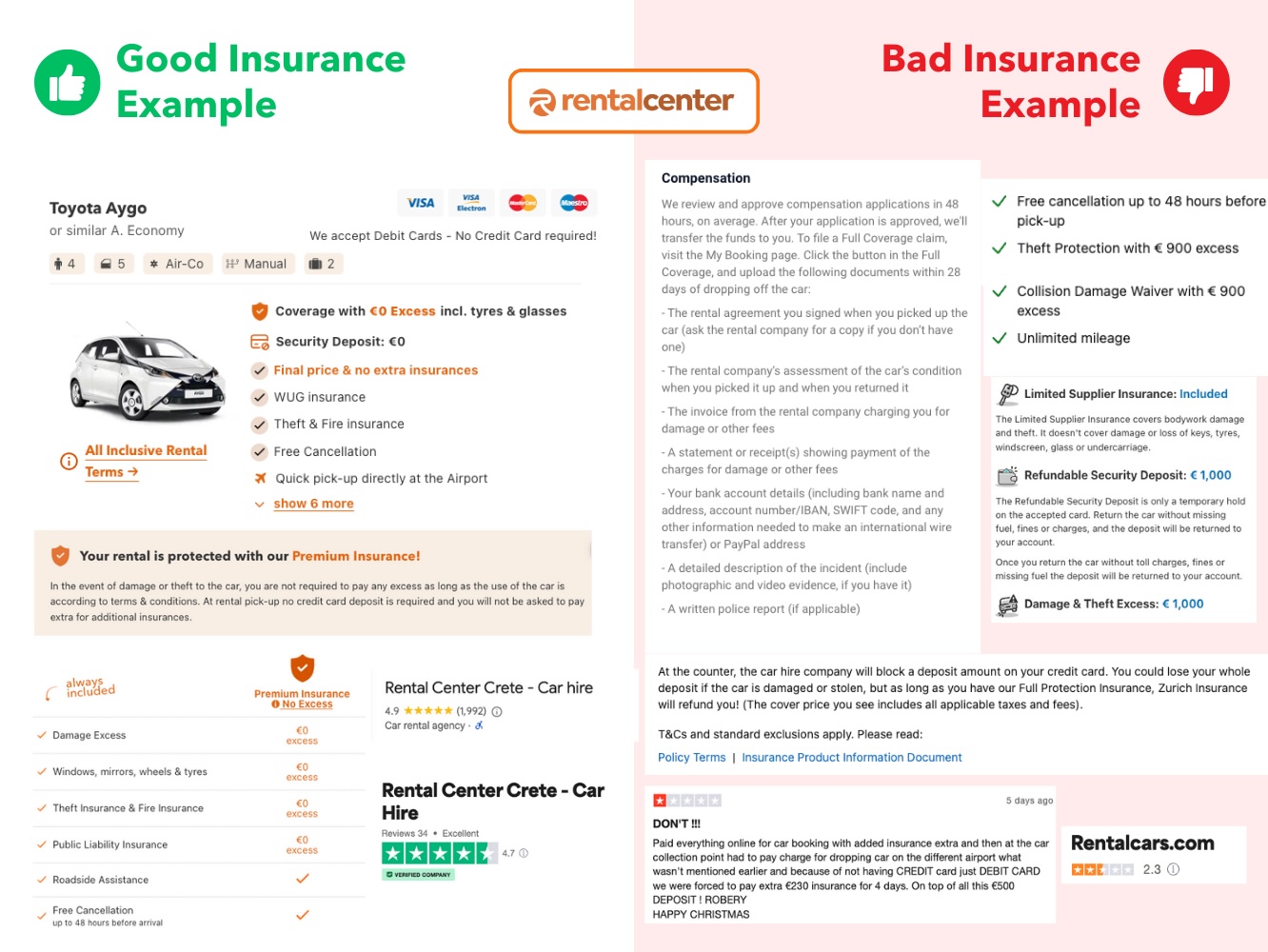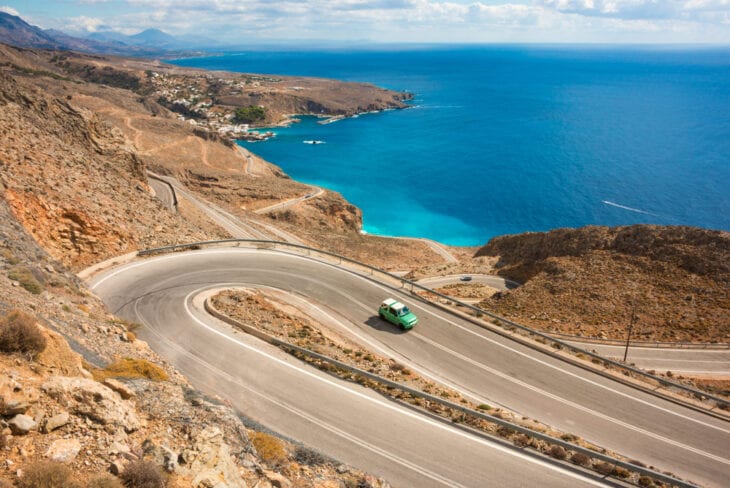Car Rental Deposit, Payments and Excess Reimbursement Explained

Car rental deposits, payments, and excess reimbursement policies are crucial elements of the car hire process that ensure smooth transactions for both renters and companies. A deposit, typically held as a credit card pre-authorization, acts as security for potential damages, theft, or unpaid fees. Depending on the vehicle type, rental duration, location, and insurance coverage, average cost of basic insurance in Crete is between €10 ($10.89, £8.70) and € 20 ($21.77, £17.40) per day, while comprehensive coverage ranges between €30 ($32.66, £26.10) and €40 ($43.54, £34.80) per day. Refunds are usually processed within 5 to 30 business days upon vehicle return. Payment flexibility is increasing, with options like debit cards, PayPal, and cash in specific cases. Excess reimbursement insurance provides financial protection by covering out-of-pocket expenses for damages, typically not included in standard car rental policies.
How does the car rental deposit work?
A car rental deposit, or “security deposit”, is money held temporarily by the rental company to cover potential damages, theft, unpaid fees or other costs during the rental. The car hire deposit required at pickup is refunded after the car is returned in good condition and all terms are met.
Deposit amounts depend on several factors, including the car type (with luxury vehicles requiring higher deposits than economy cars), rental duration (longer rentals often increase deposit amounts), pickup / dropoff location, and renter’s age (younger drivers or high-risk areas lead to higher deposits), and insurance coverage (full coverage may reduce or eliminate the deposit).
Car hire Deposits are held as a credit card pre-authorization, blocking but not charging the amount, though debit cards may result in a complete withdrawal and later refund. Rent a car Deposit ranges from €450 ($477, £383.22) to €600 ($636, £511.75). Refunds of deposit are processed without issues after the car is returned, taking 5 to 30 business days, depending on the rental company and bank. Renters should review the car rental agreement to ensure clarity on deposit policies and refunds.
Why do car rental companies place a hold on my card?
Car rental companies place a hold, or “preauthorization”, on renter’’s credit or debit card to secure funds for potential charges during the rental. It temporarily blocks a specific amount but does not charge it, ensuring coverage for damages, theft, fuel discrepancies, or extra services.
For example, a €470 ($500, £404.88) rental might involve a €940 ($1,000, £809.75) hold to account for unforeseen costs. The hold protects the rental company financially while reducing your spending limit. Unlike a deposit, which may be charged and refunded, a hold reserves funds and releases the unused amount after the rental. Release timelines vary by bank, car hire company and take 5 to 30 days.
The main difference between holds and excess lies in their purpose and application in financial terms. Excess refers to your maximum financial liability for damage or loss before your insurance coverage takes effect. In contrast, a hold secures upfront costs temporarily, often as a precautionary measure by a service provider or insurer.
How is the car hire deposit amount calculated?
Car rental deposit amounts depend on 4 factors assessing risk and rental value. Luxury vehicles require higher deposits due to higher repair or replacement costs, while economy cars have lower deposits. Longer rental durations increase risk, resulting in higher deposits. Younger drivers, particularly those under 25, face higher deposits due to perceived danger. Comprehensive insurance coverage can reduce or eliminate deposits. Rental location affects deposit amounts, with high-demand or metropolitan areas often requiring more. Rental company policies and risk assessments impact deposit amounts. Deposits may be a fixed amount or a percentage of the rental cost, held as a credit card pre-authorization, or withdrawn with a debit card.
Find below an image showing good and bad car rental insurance examples.

Which Payment Methods Are Accepted by Car Rental Companies in Crete?
Car rental companies in Crete accept 6 payment methods. These flexible options cater to different preferences, offering no-deposit or no-credit-card-required policies for added convenience.
- Credit Card: Credit Cards are the most commonly accepted car rental method. Visa, Mastercard, American Express, and Diners are used for payments and pre-authorizations (holds) for deposits.
- Debit Card: Many rental companies accept debit cards, which can be used for payments or deposits. Unlike credit cards, the deposit amount is often fully charged and refunded later, which may take longer to process.
- Cash: Local car hire companies allow cash payments for the entire rental cost or as a deposit. This is less common but still an option with certain local agencies in Crete. Cash payments may require additional documentation or guarantees.
- PayPal: PayPal is an increasingly popular digital payment method offered by some car rental companies in Crete. Renters should call the company and confirm the availability of PayPal payments for deposits and car rental fees.
- Bank Transfer: Other rental car agencies accept bank transfers for advance payments. This method is helpful for those who prefer not to use cards but require prior arrangement and confirmation from the rental company.
- Prepaid Cards: Certain agencies also accept prepaid cards for payments, though their use may be limited compared to credit or debit cards.
Can I use a debit card for excess car rental coverage?
Yes, renters can use a debit card for excess coverage for car rental, but policies vary by company. Travelers seeking Crete car rental without a credit card will find some companies that accept debit cards for excess deposits. Debit card transactions often involve a full charge rather than a pre-authorization hold, unlike credit cards. The funds are debited upfront and later refunded, which may take up to 30 days. Some rental companies near Crete require purchasing excess waiver insurance when using a debit card, which can help reduce or eliminate the excess liability.

Do I have to pay a deposit to rent a car in Greece?
Most car rental companies in Greece require a deposit to cover potential damages, which is refundable if the vehicle is returned in good condition. Payment methods of the car rental deposit often include debit cards, cash, or credit card holds.
At Rental Center Crete, we don’t require a credit card. If you’re paying in advance before you arrive in Crete, you can call us and make arrangements to use a bank transfer if you’d rather not use your credit or debit card.
Can I Pay in Cash for a Car Rental Deposit?
Yes, paying a car rental deposit in cash is possible with specific rental companies, like Rental Center Crete. Companies may accept cash deposits under particular conditions, such as providing proof of identity, utility bills, and insurance. Renters may also need to pay the entire rental cost and deposit upfront.

Are There Ways to Rent a Car Without a Deposit?
Yes, renting a car without a deposit is possible by choosing car rental companies that offer zero-deposit services or full insurance car hire packages. Rental agencies provide options like prepaid rentals or complete insurance coverage that eliminates the need for a deposit. These services require booking in advance. Rental Center Crete is a local car hire company that rents cars without a deposit or excess.
Is it possible to rent a car in Crete without paying a deposit?
Yes, renting a car without paying a deposit is possible with local car hire companies. These agencies offer no-deposit rentals and allow payment upon arrival in cash or by card. They typically include full insurance coverage with no excess liability, ensuring worry-free rentals without requiring a credit card or deposit hold.
What is the typical car rental deposit cost in Crete?
In Crete, car rental deposits vary by company. Many local providers, such as Rental Center Crete, do not require deposits, offering rentals without pre-authorization or cash holds. These companies typically include full insurance with zero excess, removing customer liability for additional costs. For companies requiring deposits, amounts range from €450 ($477, £383.22) to €600 ($636, £511.75) based on the car group. Most local agencies in Crete favor no-deposit policies for a more customer-friendly approach.
How long does it take to get my deposit refunded?
Car rental deposit refunds vary by rental company and payment method. Most companies process refunds within 5 to 30 business days, with credit card pre-authorizations released faster than debit card refunds. Rental Center Crete processes refunds for canceled bookings within five business days, while other companies in Crete may take longer, depending on bank processing. Deposits not returned within the stated time frame require customers to contact the rental company, and submit necessary documentation. Continued delays allow escalation through formal complaints or legal channels, as unjustified deposit withholding breaches regulations.
What Is Excess Reimbursement Insurance for Car Hire?
Excess Reimbursement Insurance for car hire, also known as car hire excess insurance or damage refund insurance, is a policy that reimburses you for the excess amount you must pay if your rental car is damaged, stolen, or involved in an accident. The “excess” (or deductible) is the maximum amount you are liable to pay under the rental agreement before the rental company’s insurance covers the remaining costs. This car rental excess can range from € 650 ($700, £570) for small vehicles and € 1,300 ($1,400, £1,140), depending on the vehicle type, location and rental company.
Excess Reimbursement Insurance is typically not included in standard car rental agreements but can be purchased as an add-on from the rental company —often at a premium—or more affordably from third-party insurers. Policies may also cover additional items like tire damage, windscreens, and undercarriage, which are usually excluded from standard coverage. If you have this insurance and incur damage fees, you must first pay the rental company and then claim reimbursement from your insurer by providing the necessary documentation.

What type of insurance is included with car rentals in Crete?
Crete rentals typically include various insurance options to protect renters from financial liabilities. Some Crete car rental insurance offers comprehensive packages that include all these coverages with zero excess fees.
Below is a list of insurances types available with Greece car rentals:
- Third-Party Insurance (TPI): Third-Party Insurance (TPI) covers damages and injuries caused to third parties, including their vehicles or property, and is mandatory in Greece. It is usually included in the rental price.
- Collision Damage Waiver (CDW): Collision Damage Waiver limits the renter’s financial responsibility for damage to the rental car in case of an accident. CDW often comes with an excess amount that the renter must pay.
- Full Damage Waiver (FDW): Full Damage Waiver is an upgraded version of CDW that eliminates the excess amount, providing full coverage for damages to the rental vehicle.
- Theft Protection (TP): Theft Protection covers the cost of the rental car in case it is stolen, though negligence may void this coverage.
- Fire Protection (FP): Fire Protection protects against damage caused by fire to the rental car.
- Personal Accident Insurance (PAI): Personal Accident Insurance covers medical expenses, disability, and death benefits for the driver and passengers in case of an accident.
- Tyre, Wheels, and Undercarriage Insurance (TWU): Tyre, Wheels, and Undercarriage Insurance provides coverage for damages to tires, wheels, and the underbody of the vehicle caused during everyday use on public roads.
- Glass and Mirrors Insurance: Glass and Mirrors Insurance covers damages to windows, windshields, and mirrors without excess fees.
Last updated on January 21st, 2025














